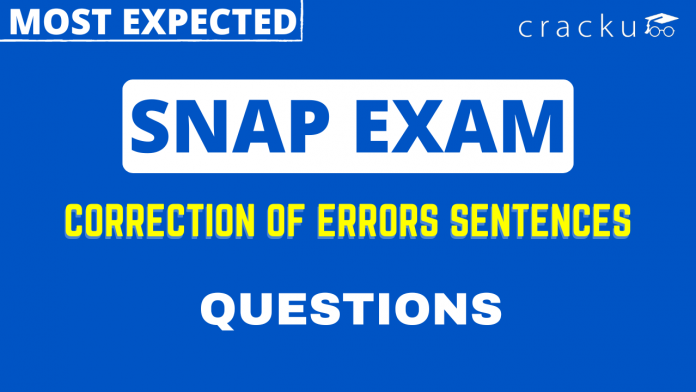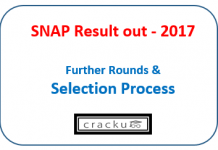SNAP Correction of Errors in sentences Questions PDF
Correction of Errors in Sentences is an important topic in the Quant section of the SNAP Exam. You can also download this Free Correction of Errors in Sentences Questions for SNAP PDF (with answers) by Cracku. These questions will help you to practice and solve the Correction of Errors in Sentences questions in the SNAP exam. Utilize this PDF practice set, which is one of the best sources for practising.
Download Correction of Errors in sentences Questions for SNAP
Enroll to SNAP 2022 Crash Course
Instructions
Following statements have given in different parts like (A),(B),(C),(D), and you need to identify which part of the sentence has the error .if no statement have the error you can give your answer (E).
Question 1: The report is candid in admitting (A) / that the investment by the government (B) / in healthy and family planning (C) / have been eroded considerably (D) No error(E)
a) A
b) B
c) C
d) D
e) E
1) Answer (D)
Solution:
In part D of the sentence, replace ”have been” with ”has been”.
Instructions
In these questions, read the sentence to find out whether there is any grammatical error in it. The error, if any, will be in one part of the sentence. Mark that part with the error as your answer. If there is no error, mark ‘No error’ as your answer. (Ignore the errors of punctuation, if any.)
Question 2: During our visit to the hill station, we (a)/ came across signboards which read that (b)/ the area where we was (c)/ under observation by the neighbouring country. (d)/ No error(e)
a) During our visit to the hill station, we
b) came across signboards which read that
c) the area where we was
d) under observation by the neighbouring country
e) No error
2) Answer (C)
Solution:
‘We’ is plural and therefore should be followed by plural verb. So, ‘was’ is incorrect and it must be replaced with ‘were’.
Hence, option C is the correct answer.
Question 3: A lot of research has been (a)/ conducted on the field human (b)/ resources for understanding what creates (c)/ work culture in an organisation. (d)/ No error(e)
a) A lot of research has been
b) conducted on the field human
c) resources for understanding what creates
d) work culture in an organisation
e) No error
3) Answer (C)
Solution:
Part C contains the error. ‘to understand’ must have been used instead of ‘for understanding’. Since the statement that follows is in simple present tense, the usage of present continuous tense is inconsistent. Hence, C is the right answer.
Instructions
In the following questions, read each sentence to find out whether there is any grammatical error in it. The error, if any, will be in one part of the sentence. Select the part with the error as your answer. If there is no error, select ‘No error’ as your answer. Ignore the errors of punctuation, if any.
Question 4: Organic milk has (a) / higher omega-3 fat levels, (b)/ but probability not enough (c)/ to make a difference. (d)/ No error (e)
a) Organic milk has
b) higher omerga-3 fat levels
c) but probability not enough
d) to make a different
e) No error
4) Answer (C)
Solution:
The correct sentence is “Organic milk has higher omega-3 fat levels, but probably not enough to make a difference.”
Instructions
In the following questions, read each sentence to find out whether there is any grammatical error in it. The error, if any, will he in one part of the sentence. Select the part with the error as your answer. If there is no error, select No error’ as your answer. Ignore the error of punctuation, if any.
Question 5: Emerging economies are (a)/ dominating the news (b)/ but for (c)/ all the wrong reasons. (d)/ No error (e)
a) Emerging economies are
b) dominating the news
c) but for
d) all the wrong reasons
e) No error
5) Answer (E)
Solution:
Sentence is grammatically correct
Take SNAP mock tests here
Enrol to 10 SNAP Latest Mocks For Just Rs. 499
Question 6: Consumers are constantly been (a)/ encouraged to take (b)/ advantage of the (c)/ lowered interest rates. (d)/ No error (e)
a) Consumers are constantly been
b) encouraged to take
c) advantage of the
d) lowered interest rates
e) No error
6) Answer (A)
Solution:
“been” is incorrect form of the verb used. It should be consumers are constantly being encouraged or simply consumers are constantly encouraged.
However if been is to be used, then correct sentence can also be consumers “have” constantly been instead of “are”
Question 7: Skeptics worries that the devaluation (a)/ of the country’s currency is (b)/ a desperate move to (c) / bail out struggling exporters. (d)/ No error (e)
a) Skeptics worries that the devaluation
b) of the country’s currency is
c) a desperate move to
d) bail out struggling exporters
e) No error
7) Answer (A)
Solution:
“worries” is an incorrect form of the verb here. Skeptics “worry ” should be correct
Question 8: Many citizens are gravitating (a)/ towards the nation’s (b)/ second-largest State because it offer (c)/ ample job opportunities. (d)/ No error (e)
a) Many citizens are gravitating
b)
- towards the nation’s
c) second-largest State because it offer
d)
- ample job opportunities
e) No error
8) Answer (C)
Solution:
we use “verb+s ” form after it , so ” it offers” should come in place of ” it offer ”
Instructions
Choose the part of the sentence that contains a grammatical error. Choose option 5 if the sentence is grammatically correct as it is. Ignore errors in punctuation.
Question 9: We reached at (1) / the platform just as (2) / the train was (3) / pulling into the station. (4) / No Error (5)
a) 1
b) 2
c) 3
d) 4
e) 5
9) Answer (A)
Solution:
The verb “reached” should not be followed by the preposition “at”. Hence, the sentence should have been “We reached the platform just as the train was pulling into the station.”
Question 10: In spite of the warnings (1) / given by parents, (2) / the school did not do enough (3) / to keep their students safe. (4) / No Error (5)
a) 1
b) 2
c) 3
d) 4
e) 5
10) Answer (D)
Solution:
The school is a singular noun and hence we should use the singular pronoun “its” instead of “their”. Hence, the sentence should have been “In spite of the warnings given by parents, the school did not do enough to keep its students safe.”
Question 11: When I met her (1) / at the engagement, (2) / I asked her not to (3) / dwell over her past. (4) / No Error (5)
a) 1
b) 2
c) 3
d) 4
e) 5
11) Answer (D)
Solution:
The correct preposition to use is “on” after “dwell”. Hence, the sentence should have been “When I met her at the engagement, I asked her not to dwell on her past”.
Question 12: While refereeing the match, (1) / he failed to point out the (2) / other team had (3) / an extra member on the ground. (4) / No Error (5)
a) 1
b) 2
c) 3
d) 4
e) 5
12) Answer (B)
Solution:
There should be a “that” after “point out”. Hence, the sentence should have been “While refereeing the match, he failed to point out that the other team had an extra member on the ground”.
Question 13: While designing interfaces (1) / for apps that will be (2) / used in developing countries, (3) / it’s better to use explicit controls. (4) / No Error (5)
a) 1
b) 2
c) 3
d) 4
e) 5
13) Answer (E)
Solution:
The sentence is grammatically correct. Hence, option E.
Instructions
Choose the part of the sentence that contains a grammatical error. Ignore errors in punctuation. Choose option 5 if there is no error.
Question 14: She spent the afternoon (1) / cleaning the study, (2) / dusting the shelves and (3) / arranged the books. (4) / No Error (5)
a) 1
b) 2
c) 3
d) 4
e) 5
14) Answer (D)
Solution:
The sentence has a parallelism error. The last verb should also have been in the -ing form. Hence, the sentence should have been “She spent the afternoon cleaning the study, dusting the shelves and arranging the books.”
Question 15: She spent the afternoon (1) / cleaning the study, (2) / dusting the shelves and (3) / arranged the books. (4) / No Error (5)
a) 1
b) 2
c) 3
d) 4
e) 5
15) Answer (D)
Solution:
The sentence has a parallelism error. The last verb should also have been in the -ing form. Hence, the sentence should have been “She spent the afternoon cleaning the study, dusting the shelves and arranging the books.”
Question 16: Had she started (1) / from home an hour earlier, (2) / she will have reached the (3) / convention centre on time. (4) / No Error (5)
a) 1
b) 2
c) 3
d) 4
e) 5
16) Answer (C)
Solution:
There is a tense consistency error in the sentence. It should have been “Had she started from home an hour earlier, she would have reached the convention centre on time.”
Question 17: The two politicians (1) / have the same stand (2) / with respect of (3) / gun safety laws and gay marriage. (4) / No Error (5)
a) 1
b) 2
c) 3
d) 4
e) 5
17) Answer (C)
Solution:
The phrase “with respect of” is incorrect. The correct idiom to use is either “in respect of” or “with respect to”. Hence, the sentence should have been “The two politicians have the same stand with respect to gun safety laws and gay marriage”.
Question 18: Each one of us (1) / are responsible for (2) / the mess we find (3) / ourselves in. (4) / No Error (5)
a) 1
b) 2
c) 3
d) 4
e) 5
18) Answer (B)
Solution:
Each is a singular noun and hence should be accompanied by the singular verb “is” instead of “are”. Hence, the sentence should be “Each one of us is responsible for the mess we find ourselves in.”
Question 19: He deserves all the (1) / praise he is receiving today (2) / because the company grew ten-fold (3) / between his tenure as the CEO. (4) / No Error (5)
a) 1
b) 2
c) 3
d) 4
e) 5
19) Answer (D)
Solution:
The fourth part has a preposition error. We use the preposition “during” to indicate a period of time like tenure. Hence, the sentence should have been “He deserves all the praise he is receiving today because the company grew ten-fold during his tenure as the CEO.”




![CAT Averages Questions PDF [Important Questions] CAT AVERAGES Questions PDF](https://cracku.in/blog/wp-content/uploads/2022/07/CAT-AVERAGES-Questions-PDF-218x150.png)
